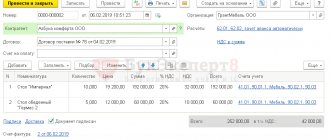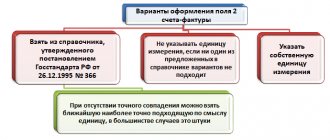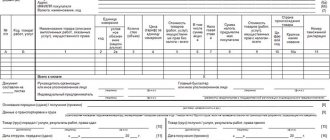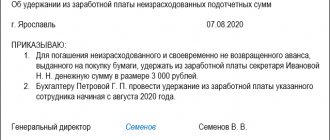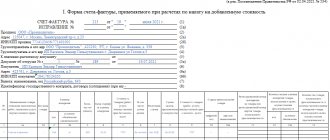An invoice is the main document that gives the buyer the right to claim the amount paid to the supplier as part of the VAT price for deduction. In the absence of such a document, the buyer loses this right. The Ministry of Finance of the Russian Federation directly points to this in its explanatory documents (for example, in letter No. 03-07-14/71091 dated September 16, 2019).
At the same time, there are suppliers who do not comply with the requirements of the Tax Code of the Russian Federation to provide invoices within 5 days from the date of shipment. As a result, buyers have problems obtaining VAT deductions. There are several options when a supplier does not want to issue an invoice.
Sending a claim to a counterparty
Receiving an invoice late does not deprive the company of the right to reflect the amount of VAT paid to the supplier in the declaration and subsequently receive a deduction. Violation of the deadline does not cancel the deduction, since controllers in such a situation retain the opportunity to establish the basic parameters of the completed transaction. Key questions that inspectors need to answer:
· parties to the transaction (buyer and supplier, customer and contractor, etc.);
· object of the transaction (goods, services, etc.);
· price;
· VAT rate.
This procedure is established in paragraph 2 of paragraph 2 of Article 169 of the Tax Code of the Russian Federation. And secured by letters of the Ministry of Finance No. 03-07-09/28071 dated April 25, 2022, No. 03-07-11/16556 dated March 14, 2022 and No. 03-03-06/1/80379 dated October 18, 2022. That is, businessmen who want to receive a deduction will have a fairly strong position.
The simplest and most logical action in a situation where the supplier has violated the deadlines for issuing an invoice is to submit a written complaint. There is no template established by law; the document is drawn up in any form.
It is recommended that the emphasis in the complaint be on the following reasons that may prompt the supplier to fulfill its obligations:
Determining the date from which the regulatory period for sending documents from the supplier to the buyer is counted. In some cases, suppliers miss deadlines due to misinterpretation of the concept of “shipment.”
Threat of a fine to the supplier for the lack of an invoice from the buyer. There is no liability for violating the deadline for issuing a document or not transferring it to the counterparty. However, in accordance with paragraph 1 of Article 120 of the Tax Code of the Russian Federation and explanatory letters from the Ministry of Finance of the Russian Federation, failure to issue an invoice is a gross violation of the rules for recording income and expenses. The absence of even one document in a quarter leads to fines, the amount of which depends on the length of the period of non-issuance of invoices and the amount of VAT underestimated for this reason.
Most often, the supplier does not issue an invoice due to differences in shipping concepts. In this issue, there are nuances when transferring goods to the carrier, shipping in parts, and the time of transfer of ownership.
The fact is that the Tax Code of the Russian Federation does not have such a concept in principle. Article 39 of the Tax Code of the Russian Federation explains what the sale of goods or services is (this is a transfer of ownership). By turning to the Civil Code of the Russian Federation, you can find out from Article 509 that shipment is the actual transfer of goods. In accordance with Article 224 of the Civil Code of the Russian Federation, transfer means the delivery of goods to the buyer or carrier, who will deliver it to the counterparty. Also, transfer is the delivery of goods to a special company that will forward the goods to the client.
Attention! There is a good chance that when shipping in batches, the supplier will wait until the last part is shipped and then issue an invoice for the entire volume.
However, letters from the Ministry of Finance of the Russian Federation and the Federal Tax Service of the Russian Federation, starting from 2012, constantly explain that for the purposes of calculating VAT, the date of shipment is considered the day when the first primary document was generated in the name of the buyer, transport company or communications company (mail).
It's useful to study here:
- Federal Tax Service letter No. ED-4-3/ [email protected] dated April 11, 2012;
- letter of the Ministry of Finance of the Russian Federation No. 03-07-11/8067 dated February 9, 2018;
- letter of the Ministry of Finance of the Russian Federation No. 03-07-08/19635 dated March 16, 2020.
In the event of a transfer of ownership of the goods after they have actually been transferred to the buyer, the period for issuing and transferring the invoice to the counterparty is calculated from the moment of actual transfer of the goods, and not from the moment of transfer of ownership in accordance with the contract.
Attention! Thus, the supplier must prepare and transmit invoices no later than five days from the actual delivery of the goods, service or work product to the buyer or carrier.
In the case of works, the date of shipment is considered the day when the act of acceptance of their results by the customer was signed. In the explanatory documents, the Ministry of Finance of the Russian Federation draws attention to the fact that the act must be signed by the customer, and not by the contractor, since the customer may have comments in accordance with the Civil Code of the Russian Federation. The date of shipment for the provision of services is considered to be the day when the act was signed by the contractor. This is the difference in determining the time of shipment for works and services.
For a better understanding, you should study the documents:
- letter of the Ministry of Finance of the Russian Federation No. 03-07-11/5795 dated February 1, 2019;
- letter of the Ministry of Finance of the Russian Federation No. 03-07-14/14948 dated March 7, 2019;
- letter of the Ministry of Finance of the Russian Federation No. 03-07-11/88016 dated October 8, 2020.
For ongoing contracts, such as rent or utility services, the date of shipment is considered to be the last period for calculating VAT. As a rule, this is the last day of the month. This is explained in the letter of the Ministry of Finance of the Russian Federation No. 03-07-11/3435 dated January 23, 2019.
How to organize your work in order to receive documents from contractors on time and not recalculate taxes
What it will protect you from:
You will not have to recalculate income tax or VAT every time due to the fact that counterparties delayed the primary invoice or invoice.
As an accountant, it is important for you to receive primary documents and invoices from your counterparties on time.
After all, if the papers arrive late in the next quarter, only then will it be possible to take into account expenses and claim input VAT deduction. That is, later than it could have been if you had received documents from your counterparties on time. Moreover, difficulties arise when documents are delayed by your suppliers. And in case buyers do not return your primary copies for a long time. In this article we will provide practical recommendations on what to do if partners are constantly delaying paperwork. Choose the tips that suit you.
We also recommend taking a look at the table below. There we showed how the fact that documents from partners were received after the close of the quarter will affect taxes. Moreover, you can see what risks arise if the documents are delayed by your buyers. And vice versa, when documents are not delivered on time by suppliers.
How to calculate taxes if documents from suppliers or buyers arrived very late
| Late document | Tax | The documents were detained by the seller | The documents were detained by the buyer |
| Invoice | VAT | If you have an envelope with a postmark that confirms that the documents arrived later, then deduct input VAT on the date of actual receipt of the invoice. Is there no such evidence? Then the deduction must be shown in the previous period. To do this, make an additional sheet to the purchase book for the last quarter and submit an update | In any case, VAT must be calculated on the date when you prepared the invoice. If you did not do this right away, then fill out now an additional sheet for the sales book of the previous period. And also pay the arrears and penalties and submit an updated declaration to the inspectorate |
| Invoice, act or other primary document | Income tax | You can recognize expenses in the current period, and then you will be able to do without clarification. But when it comes to goods, you can write off their cost only if you have already sold these products to further customers. Have you already accepted the goods for accounting and written off their cost as expenses as uninvoiced supplies? Then you will have to recalculate the costs. Before this, if necessary, pay the arrears and penalties, submit an amendment | Income must be taken into account on the same day as the primary income statement is dated. If you do not do this right away, you will need to pay the arrears, penalties and submit an updated declaration |
What do you do most often if counterparties delay documents?
Tip one: write in the contract how you will exchange documents with the counterparty
Suppose you have a counterparty with whom you have been working for a long time, but you often receive documents from them late. Another situation: you are just about to enter into a long-term contract with a partner and assume that you will have to frequently exchange papers with him.
In such cases, we recommend establishing special conditions either in a new contract or in an additional agreement to the existing one. Namely, write down in what ways you and your partner will exchange papers, at whose expense the transfer will take place.
Let's say the counterparty is in the same city as you. Then establish that the partner will have to deliver the documents by courier, and indicate within what time frame. Or, perhaps, you will send your representative for the papers. In this case, do not forget about the deadlines.
What if the partner is in another city? Write down in the contract a condition that the parties will exchange papers by express mail. And since its services are more expensive than regular mail, specify in the agreement at whose expense the documents will be sent.
Of course, this is only possible if the counterparty agrees to include such a condition in the contract. That is, when both parties to the contract want to put things in order in the document flow.
Another piece of advice for when you exchange a large number of documents with a counterparty. It would be useful to include in the contract the condition that at the end of the month the parties send each other a list of documents received for signature and sent.
This way you can control which documents you have not yet received from your partner. We have provided a sample agreement with a clause on the exchange of documents below.
Shares his experience: Olesya Kachan
— Chief accountant of Business Alliance LLC:
— In the contracts we indicate: copies of documents are correct as long as there are no originals.
Tip two: ask buyers for scanned copies of documents
Here's another piece of advice in case your buyers (customers) have still not returned some copies of invoices and acts to you. First, contact them and find out what the reason is. Perhaps the buyer has not yet signed the deed or invoice. Let's say, because the goods are in transit. Or the partner’s director did not have time to sign the act.
In this situation, ask the buyer's accounting department to contact you as soon as the documents are ready. And ask to send you scanned copies of signed documents. This will help you make sure that the buyer agreed to the initial delivery.
Let us explain why it is still important to obtain signed originals of your own documents.
In general, it is safe to recognize income in tax accounting in the quarter in which you issued invoices or acts (transferred goods, provided services or performed work). That is, do not wait for counterparties to sign them. Officials and judges insist on this. Examples are the letter of the Ministry of Finance of Russia dated November 13, 2009 No. 03-03-06/1/750 and the determination of VASRF dated December 8, 2010 No. VAS-15640/10. Officials and judges argue for this by saying that when calculating income tax, income from sales is determined at the time when ownership of goods (work, services) is transferred to the buyer. And this, according to officials, happens when the supplier signs the primary agreement.
You also need to charge VAT immediately after you issue an invoice to the buyer. After all, the tax base is determined on the date of shipment of goods or transfer of work and services. This is directly stated in Article 167 of the Tax Code of the Russian Federation. That is, here too, it would seem, it is not necessary to wait for your copies signed by the counterparty.
Still, we recommend getting buyers to return the papers with signatures to you. Without primary income, you can be fined for gross violations of the rules for accounting for income and expenses under Article 120 of the Tax Code of the Russian Federation. The size of the penalty is 10,000 or 30,000 rubles.
Carefully!
Recognizing expenses based on copies of documents alone is risky.
There is another reason why it is still worth requesting primary information from buyers. Perhaps the counterparties did not agree with the results of work, services, or refused some goods. This means that your revenue and VAT tax base may change. You will only learn about this after receiving initial feedback from buyers. And if you have already reflected the transactions without waiting for the signature of the other party, you will have to adjust the revenue and the VAT amount.
But note: in the opposite situation, when documents are delayed by the supplier, recognizing expenses based only on scanned copies is risky. Tax authorities may simply not recognize such evidence without living signatures. In any case, you must have the originals of the primary documents from the seller in your hands.
Shares her experience: Valentina Ivoilova
— Chief accountant of Consultant LLC:
— Most often, documents are delayed by service providers. If the originals are late, we exchange copies with our counterparties by email or fax. And then, of course, we wait for the original documents from the partners.
Frequently asked questions from practice about documents
The delivery note that the buyer signed was lost in the mail. We recognized the expenses based on a scanned copy. Can inspectors require the original?
Yes, tax authorities may request original documents. The basis here is paragraph 2 of Article 93 of the Tax Code of the Russian Federation.
Is it possible to stipulate sanctions in the contract with the supplier in case he violates the deadlines for transferring documents?
Of course you can. But only if your counterparty does not object to this. In other words, if both parties to the contract are interested in establishing ideal order in the document flow.
We received a late invoice from the seller. Is it possible to deduct VAT in the current period on the basis that we have an entry in the journal of incoming documents?
No, tax authorities and judges do not agree with this (resolution of the FASS North Caucasus District dated July 7, 2008 No. F08-3751/2008).
Can we be fined under Article 120 of the Tax Code of the Russian Federation for the absence of a primary tax if we did not underestimate taxes?
Yes, if you do not have a primary income, then the auditors will consider this a violation under Article 120. It does not matter whether you have arrears or not. It’s just that in case of arrears, the amount of the fine will be higher.
Tip three: send a letter to the director of the counterparty requesting original documents
A conversation with the counterparty's accounting department does not always produce results. If there are still no documents, then it makes sense to write a letter addressed to the partner director (we have provided a sample below).
In the letter, demand that documents be provided as soon as possible. And explain to the counterparty what your company is risking due to the fact that he delays the documents.
Such a letter will also help if you reflected transactions based on scanned copies, and tax inspectors came to check you. But here it’s worth hurrying up and, if possible, sending the letter immediately electronically or by fax.
To quickly receive original documents from your counterparty, ask the director of your company for help. A letter on his behalf or a phone call can speed up the receipt of the necessary initial receipt and invoices.
But before sending the director to the partners, conduct a briefing. Explain to your boss why the originals are needed and what tax risks your company will face without the counterparty’s documents.
Shares her experience: Marina Artyushenkova
— chief accountant of Press Bureau LLC:
— The question about documents that counterparties are holding back is very relevant for me! Mostly I write letters or call them. I convinced the director to help me - he also calls and writes.
Tip four: fill out the documents instead of the seller
It happens when you can’t wait for documents from the seller, it’s easier to fill out the initial form and invoices yourself instead. And then just give him the documents to sign.
Important detail
In exceptional cases, you can fill out the document for the supplier and give it to him to sign.
Yes, the buyer is not allowed to fill out the initial form. Therefore, you can safely do this for the supplier (Article 9 of the Federal Law of December 6, 2011 No. 402-FZ). Yes, you can also issue an invoice. Just fill in the details of the seller and the shipper where necessary.
It is clear that you should use this advice only in extreme cases. Yes, only when we are talking about two or three documents, and not about a large volume of papers. Naturally, you will not be able to fill out primary documents and invoices regularly instead of the counterparty.
Ekaterina Savina
- expert of the magazine "Glavbukh"
Blocking counter deliveries
In order to have a time reserve for receiving documents and drawing up correct reporting, it is recommended to monitor the availability of invoices on a regular basis (with each delivery), but at least once a month.
If you leave control over the availability of documents until the end of the quarter, then the accounting staff may simply not have enough time to collect all the necessary invoices, which means that an inflated VAT will be paid. The buyer can use several tools to put pressure on the supplier.
A good option is to block deliveries or payments. It is advisable to specify such a tool in the contract in advance, otherwise the supplier may apply penalties.
For example, the contract may provide for a deadline for the fulfillment of all obligations. In this case, the counter delivery can be postponed until that day. In this case, there will be no breach of contract, but the supplier will be put in an awkward position.
Attention! It is also recommended to include a special condition in the contract. It should give the buyer the right not to make payment until receipt of a complete package of documents, including an invoice.
An effective way is to build correct work with the sales and purchasing departments. You can issue an internal regulation that prohibits the submission of an incomplete package of documents to the accounting department. In this case, employees of the relevant departments will be interested in receiving the necessary documents from the supplier. To facilitate their work, you can develop a special reminder.
The counterparty can be forced to hand over the invoices through the court
It is recommended to use the transfer of a dispute to the courts only as a last resort. Resolving an issue in court usually requires significant time and labor costs.
Moreover, in most cases, buyers lose such cases. Especially if this does not prevent the buyer from receiving a VAT deduction. In such situations, arbitration courts take the side of the supplier (Resolution of the Moscow District Court No. A40-110081/2016 of October 30, 2022).
The legal position of the courts is that an invoice is neither a thing nor a document integral to the product (for example, confirming its ownership). Therefore, the economic interests of the buyer in the absence of an invoice are not violated. In addition, the buyer and seller rarely specify in the contracts the supplier’s obligation to promptly transmit the invoice to the buyer. The reference to the requirements of the Tax Code of the Russian Federation, which reflects the supplier’s obligation to provide documents to the buyer, is not accepted by the courts, since the Tax Code of the Russian Federation regulates relations between the taxpayer and the state, and not between business entities.
At the same time, there are rare cases of decisions made in favor of buyers. For example, you can pay attention to the resolution of the AS of the West Siberian District No. A67-8181/2016 dated June 20, 2017.
Thus, in order to increase the likelihood of a positive court decision, it is necessary to draw up the contract correctly and reflect in it the supplier’s obligation to provide invoices within the established time frame.
If three or more years have passed since the shipment, there is no point in demanding an invoice from the supplier, since the period of validity of the right to receive a VAT deduction has already expired. In such a situation, some buyers attempt to force the supplier to compensate for losses or lost profits in the amount of overpaid VAT due to failure to provide an invoice.
To obtain a positive decision in court you will need:
· providing evidence of damages caused by the supplier to the buyer;
· calculation of their size;
· description of which regulations were violated by the supplier;
· proof of the supplier’s guilt in the buyer’s losses.
Only if there is irrefutable evidence will the court side with the buyer and the latter will have the opportunity to compensate for losses. Otherwise, the court will rule in favor of the supplier.
It is useful to study the following court decisions:
· The court sided with the buyer in the ruling of the Administrative Court of the East Siberian District No. A33-9145/2015 dated September 16, 2016.
· The buyer did not provide all the necessary evidence and the court supported the seller in the decision of the Moscow District Court No. A40-130578/14 dated July 3, 2015.
Forcing the supplier to issue an invoice
There is a non-standard way to force a supplier to issue an invoice. Some companies independently issue a document from the supplier with an arbitrary number, but with data on actual shipments. After this, the document is reflected in the purchase book and VAT return.
An automatic system for conducting desk audits on VAT will detect discrepancies between the data of the supplier and the buyer. The difference will be exactly the same as the self-generated document reflected by the buyer. The supervisory authority will request clarification from the parties to the transaction.
Upon receipt of the request for clarification, the supplier will have to issue an invoice. After this, the buyer will need to submit an updated declaration and make adjustments to the purchase books, since the supplier’s invoice number will be different.
For reference! Since the VAT amount will not change, and the documents will be the same for the supplier and the buyer, there will be no problems in the future.
In addition, you can force the counterparty to issue an invoice through the court. If the basis for refusal to deduct VAT is the absence of an invoice, and there is evidence of repeated requests from the buyer to provide documents, the arbitration court may side with the taxpayer. An example is the decision of the Arbitration Court of the Far Eastern District No. A51-14757/2017 dated May 31, 2022, which states that the absence of an invoice is not an obstacle to the taxpayer receiving a VAT tax benefit. The main grounds for obtaining a deduction are the real nature of the transaction and the presence of reliable information in supporting documents.
The method of forcing the generation of an invoice through the independent preparation of a document or through the court is valid if the supplier is also a bona fide taxpayer. If he is a one-day company that does not submit reports, then the buyer will simply be denied a VAT deduction on the basis that the transaction is fictitious. At the same time, the buyer will still be required to submit an updated declaration, in which the transaction with the dubious company will be absent.
How to check the reliability of a counterparty and what to do if the tax office has a claim against him
Romashka LLC, having relations with this category of supplier counterparties, overstates tax deductions for VAT in the amount of X thousand rubles (a small amount) for the 1st quarter of 2022.
The explanations must indicate methods for searching for the above-mentioned supplier counterparties, methods for checking reliability, a list of services supplied with copies of contracts, certificates of completion, invoices, etc.
We did not check the reliability of counterparty companies in any way, except for taxes. RU. We looked to see if the debts to the budget had been liquidated or not. The work for us was carried out by well-known people on a subcontract with payment upon delivery - accordingly, there were no risks from the level of “people will run away with the money” at the time of ordering the work. In 2022 they created a normal legal entity, since then everything has been ok. All that remains now is to close the tails delicately, without exposing good people. And also to work out a plan of action for the future, where we cannot be 100% sure whether the contractor is not violating something.
| We made all payments to these counterparties, documents, acts, reports, invoices - everything is available in the archive with blue seals and signatures, as expected. |
Romashka LLC assess the reality of financial and economic relations with Buttercup LLC and Tyulpan LLC, revise tax obligations and provide explanations no later than 06/03/2019. In the future, provide updated VAT returns in the direction of increase and pay the tax amount.
6. A diagram of possible scenarios for the development of events, indicating the sequence and timing in detail (first of all, the most negative scenario). What can the tax office really do, within what time frame, what are the procedures and how can we defend ourselves. Including, but not limited to:
c. If we suddenly decide to pay for the 1st quarter of 2022 (the amount is small) in order to close the issue amicably, there are still amounts for the same counterparties in other quarters of the 17th year. Is there a chance that they won’t be given the additional “locomotive” credit?
Using UPD as a way to force an invoice to be issued
If it is indicated in the contract that all transactions are formalized not with a consignment note and invoice, but with a universal transfer document, problems with receiving invoices can be avoided.
The UPD form was approved by the Federal Tax Service of the Russian Federation in 2013 by special letter No. ММВ-20-3 / [email protected] dated October 21, 2013. The supplier must draw up a document with status 1, since only in this case the UPD performs the functions of both an invoice and an invoice.
Important! The presence of invoice details in the transfer acceptance certificate does not make it a universal transfer document, therefore, it will not be a supporting document for VAT deduction. Also, you should not include UTD in status 2 in the VAT return. In this case, it will only perform the functions of an invoice, and not an invoice.
Using safe language in the contract
To reduce the risk of refusal to deduct VAT, the buyer should include certain wording in contracts with counterparties. Their meaning must be clear and unambiguously interpreted so that, if necessary, they can be appealed to in court.
Fine for lack of documents
The buyer can stipulate in the contract the responsibility of the supplier or contractor for failure to issue an invoice. It is recommended to determine the amount of the fine in the amount of the VAT deduction, which was denied by the tax office.
In such a situation, it does not matter to the buyer whether the document is received or not; in any case, he will compensate for his losses.
This formulation can also be used in the absence of an invoice due to the supplier’s transition to a simplified tax regime or if he ceased to be a VAT payer for other reasons.
Attention! The practical implementation of such a mechanism has some difficulties. Thus, regulatory authorities may point out that taxation is the sphere of regulation of public law, and not civil relations.
In addition, even after receiving a fine, the buyer can claim the invoice within three years and receive a VAT tax benefit. The result is unjust enrichment. Thus, the supplier has arguments to challenge this provision of the contract in court.
Statement of Circumstances
It is a way to reduce the risk of non-receipt of an invoice by the buyer due to the loss of the supplier’s VAT payer status. This form of protecting one’s rights is provided for in Article 431.2 of the Civil Code of the Russian Federation. If the supplier's assurance that he pays VAT turns out to be untrue, he will have to compensate the buyer for losses.
An important condition for the applicability of this mechanism is an indication in the contract that the counterparty who gives assurance about the circumstances proceeds from the assumption that the second party is guided by this document when carrying out the transaction.
It will not be possible to compensate for losses if no assurances were received from the counterparty and the buyer did not take any action to ensure that the supplier is a VAT payer. In other words, it will not be possible to recover the VAT deduction amount if the company has not determined whether the supplier is a VAT payer.
In a situation where the supplier ceases to be a VAT payer for some reason, his certification will be unreliable, and he will have to compensate the buyer for losses in the amount of the VAT deduction.
For example, in one of the cases, the court found that controllers denied the buyer a VAT refund. The buyer was able to recover VAT from the supplier, since he actually did not have the resources to fulfill the contract (Resolution of the North Caucasus District Administrative District No. A53-22858/2016 dated June 5, 2022).
Does the fact that the purchase is reflected in the buyer’s VAT return prove the sale?
Rafael USMANOV, Deputy General Director for Consulting, Scott, Riggs and Fletcher CJSC (audit):
The courts most often agree with this argument (for example, decisions of the federal arbitration courts of the Ural from 07/01/08 No. Ф09-3955/08-С2, Moscow from 05/14/08 No. KA-A40/4150-08, West Siberian from 04/30/08 No. F04-2792/2008 (4587-A46-41), Volga region dated April 15, 2008 No. A55-14893/07).
The company is not responsible for the actions of partners. There is also a decision of the Constitutional Court in support of taxpayers. Thus, in its ruling dated October 16, 2003 No. 329-O, the Constitutional Court of the Russian Federation specifically stipulated that the use of the concept of “good faith” cannot impose additional responsibilities on the company. The taxpayer is not responsible for the actions of all organizations participating in the multi-stage process of paying and transferring taxes to the budget (decrees of the Moscow Federal Arbitration Court No. KA-A41/8662-08 of September 15, 2008, No. A56-38571/ of the North-West Federal Arbitration Court of September 5, 2008). 2007, Volga region dated August 28, 2008 No. A65-610/08 districts).
| Companies can cite several arguments in their defense. There is a high probability that the court will take them into account when making a decision. |
— In a recent ruling dated August 19, 2008 No. 8947/08, the Supreme Arbitration Court also emphasized that failure by counterparties to fulfill their obligations to pay VAT cannot serve as a basis for denial of tax deductions.
The dependence of the deduction on the payment of VAT by the counterparty has not been established. Tax legislation does not provide for such a basis for receiving tax deductions as payment of VAT to the budget by suppliers. Article 172 of the Tax Code of the Russian Federation states that a company can receive a deduction if three conditions are met: the goods, work, service are capitalized, intended for activities subject to VAT, and the company has an invoice. There are no other conditions for deduction, and tax authorities do not have the right to add new ones.
There is no obligation to check the counterparty. When justifying their claims, neither tax authorities nor the courts that take their side refer to the Tax Code. After all, there is not a word about the need to check the supplier. Rather, on the contrary, there is an indication that the taxpayer does not have the right to monitor his counterparties. Even failure to fulfill the obligation to pay tax to the budget, if this cannot be qualified as a tax offense, is a tax secret that is not subject to disclosure (subclause 3, clause 1, article 102 of the Tax Code of the Russian Federation).

